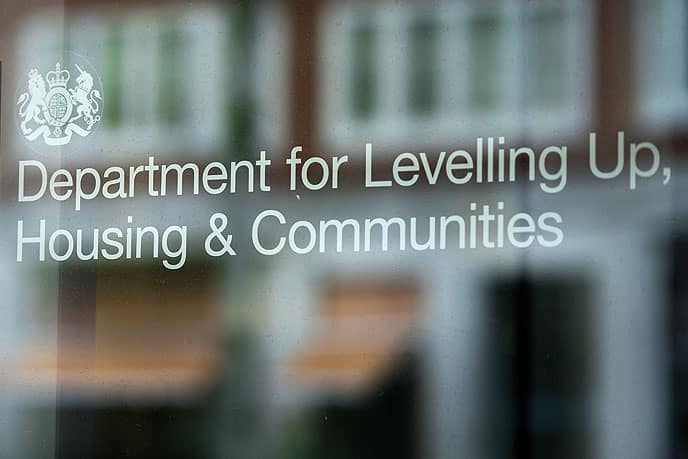This Month In Social Housing: May 2024
Summer is (sort of) upon us, bringing with it the promise of warmer days, sizzling barbequed meats, cool, crisp alfresco beverages, and England exiting an international tournament at the quarter or semi-final stage. But before we steel ourselves in readiness for all that, there’s a load of stuff that’s happened in the world of social housing (that you might not have clocked) over the past thirty days to get through. Thankfully though, we’ve only gone and done another of our easily digestible news round-ups. So, sit back, ensure you’re sitting comfortably and take ten minutes to catch up on what you may have missed in the May edition of This Month In Social Housing…

Research Suggests Nine Times More Women Rough Sleeping Than Government Stats Claim
A new study by the London Women’s Rough Sleeping Census suggests that up to nine times more women are sleeping rough in England than government statistics indicate. Conducted by women’s and homelessness organisations, the report found 815 women sleeping rough in a week-long census across 41 local authority areas, compared to the government’s count of 189 women in the same areas. Some discrepancies were stark; for example, Greater Manchester’s census identified 188 women, while the government’s count found only five. The study highlights that many women sleep in “hidden” locations such as A&E waiting rooms, buses, trains, and squats, which are often overlooked in official counts. The findings call for improved recognition and response to women’s rough sleeping, emphasising the dangers and unique challenges they face. The coalition behind the study includes Solace, the Single Homeless Project, and Change Grow Live.

MPs Say Affordable Housing Should Be Left to Private Sector to Free Up Social Housing Grant Funds
A cross-party parliamentary inquiry has recommended that private investment should fund affordable rent homes to free up government grant funding for more social housing. The Levelling Up, Housing and Communities Committee criticised the current funding model for being inefficient, suggesting that affordable rent homes can be financially viable without direct grants. The MPs urged the government to set a target of building 90,000 new social rent homes annually and to use planning powers to ensure land prices do not hinder social housing development. The social housing sector faces significant financial pressures, including costs for decarbonisation, fire safety, and renovations, all while rent rises are capped. The committee also highlighted the need for increased funding for regeneration and flexibility for housing providers. The Regulator of Social Housing was advised to engage more with providers facing financial risks. The recommendations aim to address the chronic shortage of social housing and improve housing conditions across England.

No-Fault Evictions Increase by 19% in Q1 to Six-Year High
The latest Ministry of Justice data reveals a 19% increase in Section 21 no-fault evictions in England in the first quarter of 2024, reaching a six-year high. From January to March 2024, 2,682 households were evicted by bailiffs, and 7,863 landlords initiated no-fault eviction proceedings, up 15% from the previous year. Section 21 allows landlords to evict tenants with two months’ notice without providing a reason. Since the government promised to ban these evictions five years ago, nearly 29,000 households have been affected. No-fault evictions significantly contribute to rising homelessness, with 25,910 households threatened in 2023. The Renters (Reform) Bill aims to abolish Section 21 evictions and has passed its second reading in the House of Lords. However, amendments have sparked controversy, potentially delaying the ban and reintroducing fixed-term tenancies. Shelter and other organisations urge major revisions to the bill to ensure lasting change for renters.

Regulator Accused of Ignoring True Extent of Tenancy Fraud
Alan Bryce, a non-executive director at the Tenancy Fraud Forum (TFF), has accused the Regulator of Social Housing (RSH) of ignoring tenancy fraud, which he says detracts from addressing homelessness. The accusations were made at the TFF annual conference on 15 May when Bryce urged the RSH to recognise the true extent of tenancy fraud and prioritise its eradication to provide homes for those in genuine need. He criticised housing associations for not taking the issue seriously due to the lack of direct financial loss and highlighted the absence of guidance and data transparency from the RSH. A recent Freedom of Information request revealed that between 2022 and 2023, 204 tenancy fraud cases were reported, with financial losses attached to only 41 cases. The RSH responded by stating that it requires landlords to have robust processes to manage tenancy fraud and have begun inspections to ensure compliance. The TFF estimates that at least 148,000 social homes could be affected by tenancy fraud.

Renters Reform Bill Shall Not Pass Ahead of General Election
The Renters Reform Bill, which aimed to ban no-fault evictions as part of a 2019 Conservative manifesto pledge, has been shelved ahead of the upcoming general election, sparking accusations of the Tories caving to “vested interests.” Promised by former Prime Minister Theresa May and carried forward by Boris Johnson and Rishi Sunak, the bill sought to address the rise in homelessness caused by Section 21 evictions. Labour’s Shadow Housing Minister, Matthew Pennycook, criticised the decision, stating it leaves renters vulnerable to high costs, poor housing standards, and homelessness. The Liberal Democrats also condemned the move as another abandoned Conservative promise. Despite Labour’s willingness to support the bill in its current form to ensure its passage, the government chose to shelve it during the “wash-up period” before Parliament dissolves. No 10 defended the decision, citing the need for consensus during the legislative rush.
Well, that’s our burst of nicely packaged news snippets done for another month. We’re all off to have a lie down in a darkened room in preparation for the Euros (and the general election) but fear not as we’ll be back here to do it all again in a month’s time. Until then though, ciao!
- Social Housing 2025: The Experts Predict What’s Next - January 2, 2025
- This Month In Social Housing: November 2024 - December 3, 2024
- Leveraging AI in Social Housing: Building a Data Strategy for Enhanced Compliance and Efficiency - November 26, 2024